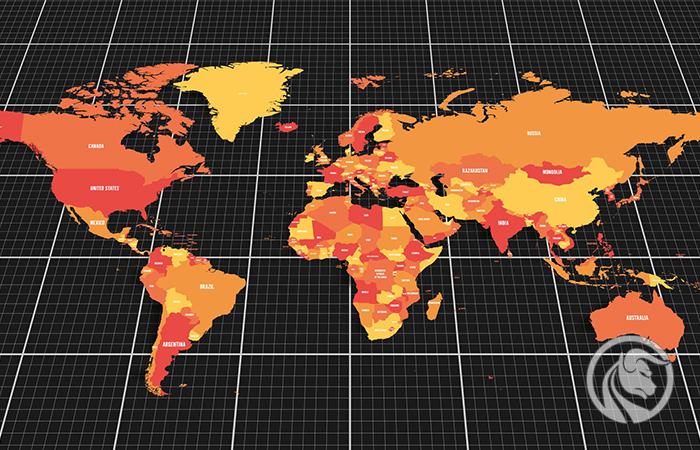Inflation on target only in 2025, unless risks materialize
In 2023, global economic growth turned out to be relatively good, and inflation fell faster than expected. However, results varied across countries, with dynamic growth in the United States and many emerging economies balanced by the slowdown in most European countries, according to the latest report OECD.
Recent indicators point to some moderation in growth, reflecting the impact of tighter financial conditions in both credit and housing markets, as well as subdued international trade activity. Attacks on ships in the Red Sea have significantly increased maritime transport costs and extended delivery times, which disrupted production schedules and increased pricing pressure.
GDP forecasts for the coming years
Global GDP growth is forecast to slow to 2,9% in 2024, from 3,1% in 2023, before rebounding to 3,0% in 2025 when financial conditions become more benign.
Annual GDP growth in the United States is expected to remain supported by household spending and strong labor market conditions, but is expected to decline to 2,1% in 2024 and 1,7% in 2025.
Height CBA in the euro area, it is expected to be 0,6% in 2024 and 1,3% in 2025, with economic activity limited by tight credit conditions in the short term before rising as real incomes strengthen.
China's growth is expected to slow to 4,7% in 2024 and 4,2% in 2025 despite additional policy stimulus, reflecting weakened consumer demand, high debt and a weak property market.
Inflation on target only in 2025
Inflation is expected to return to targets in most G20 countries by the end of 2025. Overall inflation in G20 economies is expected to fall from 6,6% in 2024 to 3,8% in 2025, with core inflation in advanced G20 economies expected to decline to 2,5% in 2024 and 2,1% in 2025 year.
However, it is still too early to be sure price pressures have been completely contained. Labor market conditions have become more balanced, but unit labor cost growth remains overall above rates consistent with medium-term inflation targets.
Risk of geopolitical tensions, threat of return of inflation
High geopolitical tensions pose significant near-term risks to economic activity and inflation, particularly if conflict in the Middle East were to disrupt energy markets. Continued pressures on service prices may as well lead to unexpected increases in inflation and cause a revaluation in financial markets as expectations for monetary easing are reassessed. Growth could also be weaker than forecast if the long-term effects from past interest rate increases turn out to be stronger than expected.
Monetary policy must remain prudent to contain underlying inflationary pressures on a sustainable basis. There is room for lower interest rates as inflation declines, but policies are expected to remain restrictive in most major economies for some time, according to a summary of a February 5, 2024 OECD report.






















![Forex Club – Tax 9 – Settle tax on a foreign broker [Download the Application] Forex Club - Tax 9](https://forexclub.pl/wp-content/uploads/2024/02/Forex-Club-Podatek-9-184x120.jpg?v=1709046278)
![Trading View platform – solutions tailored to the needs of traders [Review] trading view review](https://forexclub.pl/wp-content/uploads/2024/03/trading-view-recenzja-184x120.jpg?v=1709558918)
![How to connect your FP Markets account to the Trading View platform [Guide] fp markets trading view](https://forexclub.pl/wp-content/uploads/2024/02/fp-markets-trading-view-184x120.jpg?v=1708677291)
![CRB index – one of the popular commodity market benchmarks [Guide] crb index](https://forexclub.pl/wp-content/uploads/2024/05/indeks-crb-184x120.jpg?v=1715055656)
![How to invest in ChatGPT and AI? Stocks and ETFs [Guide] how to invest in chatgpt and artificial intelligence](https://forexclub.pl/wp-content/uploads/2023/02/jak-inwestowac-w-chatgpt-i-sztuczna-inteligencje-184x120.jpg?v=1676364263)







![Izabela Górecka – “Success on the market depends not only on knowledge, but also on emotional stability” [Interview] Izabela Górecka - interview](https://forexclub.pl/wp-content/uploads/2024/04/Izabela-Gorecka-wywiad-184x120.jpg?v=1713870578)
![WeWork – the anatomy of the collapse of a company valued at $47 billion [WeWork, part II] wework bankruptcy story](https://forexclub.pl/wp-content/uploads/2024/04/wework-bankructwo-historia-184x120.jpg?v=1711729561)
![Adam Neumann – the man who screwed up Softbank [WeWork, part AND] adam neumann wework](https://forexclub.pl/wp-content/uploads/2024/04/adam-neumann-wework-184x120.jpg?v=1711728724)
![The most common mistakes of a beginner trader - Mr Yogi [VIDEO] Scalping - The most common mistakes of a beginner trader - VIDEO](https://forexclub.pl/wp-content/uploads/2024/03/Scalping-Najczestsze-bledy-poczatkujacego-tradera-VIDEO-184x120.jpg?v=1711601376)
![Learning patience: No position is also a position - Mr Yogi [VIDEO] Scalping - Learning patience - No position is also a position - VIDEO](https://forexclub.pl/wp-content/uploads/2024/03/Scalping-Nauka-cierpliwosci-Brak-pozycji-to-tez-pozycja-VIDEO-184x120.jpg?v=1710999249)
![When to exit a position and how to minimize losses - Mr Yogi [VIDEO] Scalping - When to exit a position and how to minimize losses - VIDEO](https://forexclub.pl/wp-content/uploads/2024/03/Scalping-Kiedy-wyjsc-z-pozycji-i-jak-minimalizowac-straty-VIDEO-184x120.jpg?v=1710336731)



















Leave a Response